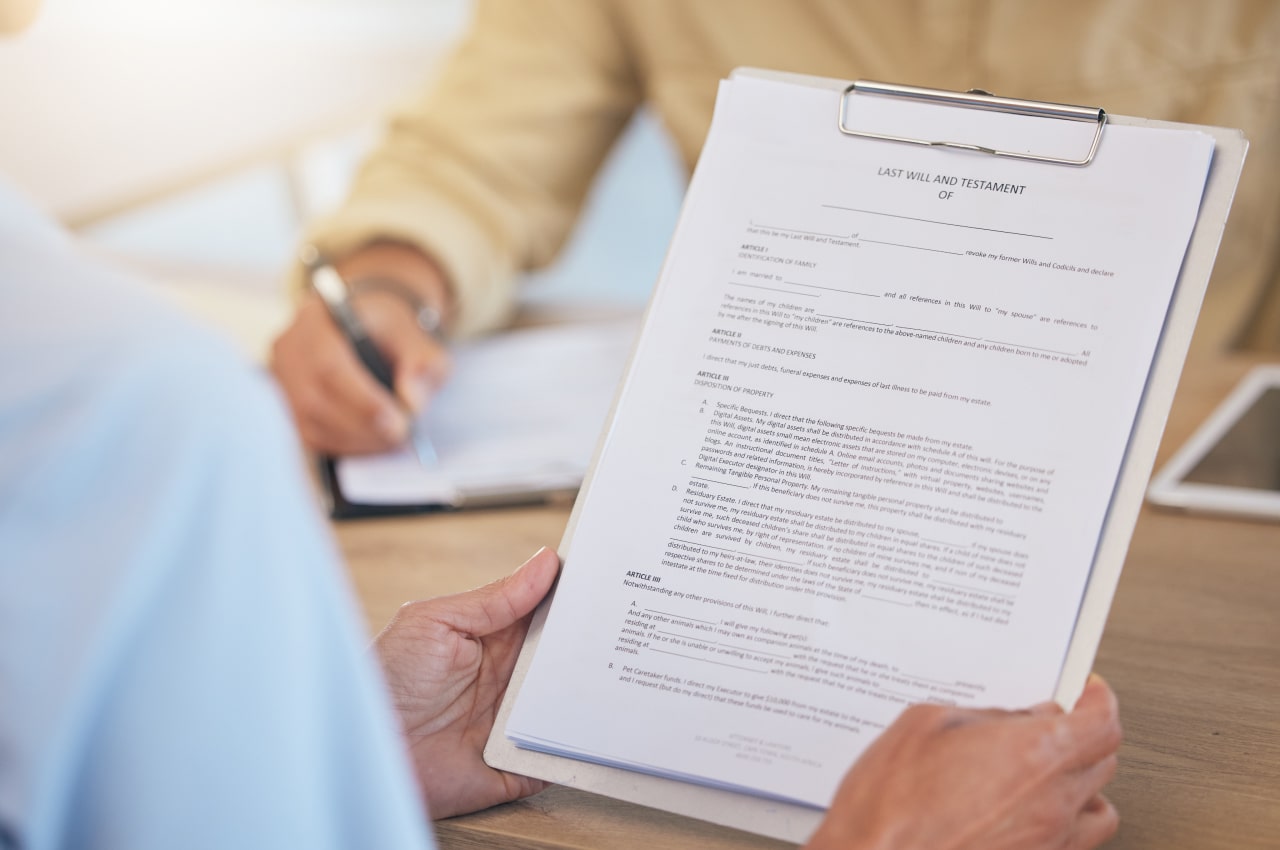What Are The Requirements For Making A Will in Florida?
What Are The Requirements For Making A Will in Florida?

Why Everyone Needs a Will—No Matter Your Age or Wealth
Many people believe that creating a last will and testament is only necessary for the elderly or those with substantial wealth. However, this is a common misconception. Regardless of your age, occupation, or financial status, having a valid will is a crucial part of estate planning. A will ensures that all your assets are distributed according to your wishes rather than being left to Florida’s intestacy laws.
Without a will, the probate court will determine how to distribute your property, which may not align with what you intended. Additionally, a will allows you to designate a guardian for your minor children, specify charitable donations, and name a personal representative to oversee your estate.
Because Florida law has strict requirements for making a will, consulting an estate planning attorney can help you create a legally sound document that holds up in court and expedites the probate process for your loved ones.

What Is A Will In Estate Planning?
A will is a legal estate-planning document that expresses a person’s wishes regarding how they want their assets to be distributed at the time of their passing. A will can include instructions, a selection of representatives, and other important notes, like the donation the testator wishes to give to charity.
One of the main purposes of creating a will is to protect your assets and the future of your family. This is because if you die without a will, the court decides on the distribution of your wealth according to the state’s intestacy law. Most of the time, it may be different from how you wish it to be.
Having a will also means that you have full control of your assets. You can ensure that your beneficiaries receive a fair share of the properties you have earned throughout your life.
A will also allows you to select the legal guardian of your minor children until they reach the legal age. If you also have pets, you can also appoint a legal guardian for them.
Requirements Of A Will For Florida Estate Planning
The requirements for creating a will vary depending on the state laws and policies. Every testator, or the one who makes the will, shall comply with these requirements to consider the will legal and binding.
In case the testator has not created the will following these laws, the will may become invalid, and the estate may be distributed under the intestacy laws. Intestacy laws apply when the decedent dies without a will.
In Florida, here are the requirements for a will to be legal and binding:
The Will Must Be In Writing
The will must be written. The probate courts of Florida will not render a will valid if it is declared orally (nuncupative wills). In the same regard, a will without the signatures of any witness (holographic will) shall be considered invalid as well.
The Will Must Be Made By A Competent Person
The person creating a will must be competent to make one. The law in Florida renders a will created by someone who is not of sound mind or is under 18 years old to be invalid.
The Will Must Contain The Signature Of The Testator
The testator must sign the will. The testator can put any symbol, letter, or initials to indicate his signature on the will. Any will created without a testator’s signature is not valid.
There Must Be At Least Two Witnesses
There must be at least two witnesses present at the signing of the will. One of the most important provisions of Florida law regarding wills is that it needs to have at least two witnesses. The witnesses must be present and see the testator sign the will.
Any person can serve as a witness, however, you want to avoid selecting those who are specifically named in the will as this may create problems of undue influence in the future.
It is also crucial that every signatory–the testators and the witnesses–must sign the will in everyone’s presence. A witness is not allowed to sign the will at a later date.
A Will May Be Changed Or Revoked
A will can be changed or revoked in Florida. The law allows a will to be amended or revoked by creating a will after the previous one or a codicil. A codicil is a document that expresses additional instructions or changes to a will.
To be acknowledged legally, a codicil shall comply with the legal requirements of executing a will.
Do You Need To Have Your Will Notarized In Florida?
In Florida, you don’t need a lawyer to render your will valid. However, you will need to have an attorney’s help if you want to create a will that is self-proving. A self-proving will is one that can pass through the probate courts without the need for witness testimonies. It is a game changer as it can speed up the process of the probate proceedings.
To make it self-proving, you and your witnesses should sign an affidavit for self-proving along with the original will. The said affidavit must be notarized to be legally binding.
What Are The Requirements For Executors Of A Will In Florida?
An executor, or personal representative, is someone you appoint to take care of your estate and attend to the probate proceedings. They will also be responsible for ensuring that everything in the will is accomplished according to your wishes. In Florida, the term personal representative is most often used to refer to executors.
The executor can be named in the testator’s will. However, not everyone can be an executor. Here are the requirements to become one.
- The executor must be 18 years old or older.
- The executor must be of sound mind and must be physically capable of performing the responsibilities.
- The executor must not have any conviction of a felony.
- The executor must either be a resident of Florida or related to you by blood, adoption, or marriage.
How To Revoke Or Change Your Will In Florida?
It is allowed in Florida to revoke your will at any time as long as you are of sound mind to do so. Generally, there are two ways you can do this.
The first way is through voluntary action. Here, intentionally burning, tearing, shredding, or destroying your will can revoke your will and make it invalid.
The second way is through executing a new will that overrides and revokes the previous one. For example, you wrote in your previous will that you would give a car to your son. Then, you changed your mind and want to give it to your daughter now. You can create a new will that states you will give the car to your daughter. This overrides the previous one, and the car shall belong to the daughter in the distribution.
You can revoke all parts of the previous will by expressly stating it in the new will. Generally, this will be a safer way to do it to avoid confusion in the future.
How an Estate Planning Attorney Can Help You Create a Will
While it is possible to draft your own will without an attorney, even minor mistakes can lead to significant legal issues. A knowledgeable estate planning attorney ensures that:
- Your will meets all legal requirements for making a will under Florida law.
- The document is properly structured to avoid ambiguities that could lead to disputes.
- Your will is drafted in a way that minimizes challenges during the probate process.
- You consider all aspects of your estate, including guardianship, tax implications, and asset protection.
Additionally, an attorney can help you create a self-proving will, which streamlines the probate process by eliminating the need for witness testimony. This requires an additional notarized affidavit, which an attorney can assist with.
The Probate Process in Florida: What to Expect
After a person passes away, their last will and testament must go through probate—a legal process in which the court validates the will, appoints a personal representative, and oversees the distribution of assets.
Steps in the Probate Process
- The will is submitted to the court.
- A personal representative is appointed to manage the estate.
- The decedent’s debts and taxes are paid.
- The remaining assets are distributed to the beneficiaries as outlined in the will.
An estate planning attorney can help guide you through probate, ensuring that the process moves as efficiently as possible while protecting your legal rights.
Contact The Estate Plan for Help
Estate planning is not just about distributing assets—it’s about securing your family’s future and ensuring your wishes are honored. At The Estate Plan, our experienced attorneys help clients create comprehensive wills that comply with Florida law and protect their loved ones from unnecessary legal complications.
Our team will:
- Ensure your last will and testament meets all legal requirements.
- Help you structure your will to avoid probate complications.
- Advise you on guardianship, tax planning, and asset distribution.
- Guide you through the probate process to settle your estate efficiently.
Don’t leave your estate to chance—let us help you create a legally sound will that gives you peace of mind. Contact The Estate Plan today to schedule a consultation.
&
Have questions about how to get started on your estate plan or estate needs?
Have questions about how to get started
on your estate plan or estate needs?
Contact the experienced estate planning professionals at The Estate Plan
by calling us at (305) 677-8489.
Contact the experienced estate planning professionals at The Estate Plan by calling us at
(305) 677-8489.

